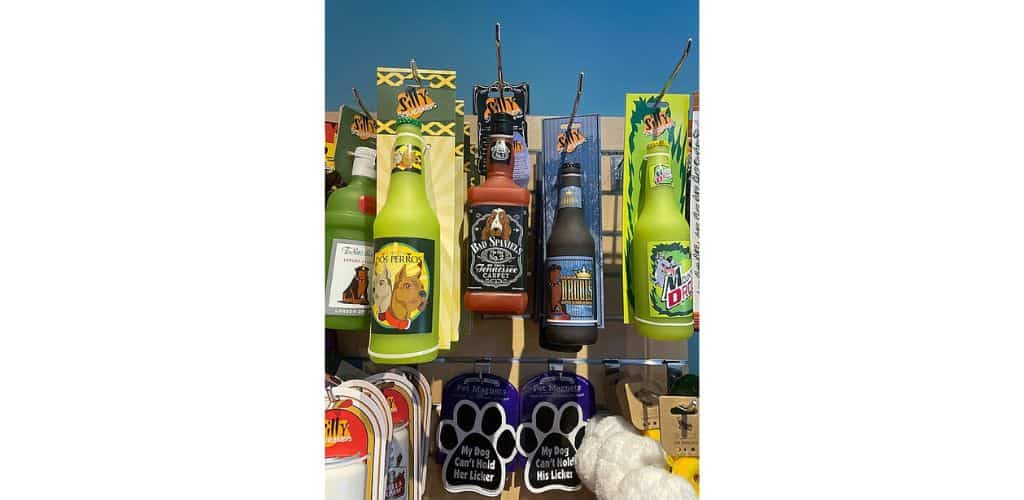The US Supreme Court has ruled that the First Amendment doesn’t protect a chew toy for dogs designed to look like a bottle of Jack Daniel’s whiskey (shown above).
As Justice Kagan explained in her opinion,
Respondent VIP Products makes a squeaky, chewable dog toy designed to look like a bottle of Jack Daniel’s whiskey. Though not entirely. On the toy, for example, the words “Jack Daniel’s” become “Bad Spaniels.” And the descriptive phrase “Old No. 7 Brand Tennessee Sour Mash Whiskey” turns into “The Old No. 2 On Your Tennessee Carpet.” The jokes did not impress petitioner Jack Daniel’s Properties. It owns trademarks in the distinctive Jack Daniel’s bottle and in many of the words and graphics on the label. And it believed Bad Spaniels had both infringed and diluted those trademarks. Bad Spaniels had infringed the marks, the argument ran, by leading consumers to think that Jack Daniel’s had created, or was otherwise responsible for, the dog toy. And Bad Spaniels had diluted the marks, the argument went on, by associating the famed whiskey with, well, dog excrement.
A tag on the toy states that it’s “not affiliated with Jack Daniel Distillery.”
The court of appeals for the Ninth Circuit had found that “the First Amendment compels a stringent threshold test when an infringement suit challenges a so-called expressive work—here (so said the court), the Bad Spaniels toy.”
Also, the court of appeals noted that trademark law provides that the “noncommercial” use of a mark cannot count as dilution and found that the toy fell within that exemption because the toy parodied Jack Daniel’s.
“The Bad Spaniels dog toy, although surely not the equivalent of the Mona Lisa, is an expressive work” that uses irreverent humor and wordplay to poke fun at Jack Daniel’s, wrote a judge for the Ninth Circuit.
Lawyers for VIP argued that they were following “in the playful parodic tradition that has ranged over a half-century from Topps’s Wacky Packages trading cards through ‘Weird Al’ Yankovic.”
As the New York Times noted,
The trading cards, for fake products that mimicked real ones, like Ratz Crackers, Jolly Mean Giant and Gulp Oil, were enormously popular in the 1970s, for a time outselling Topps baseball cards.
Under the test in the case of Rogers v. Grimaldi, a trademark infringement claim must be unless the complainant can show one of two things: that the challenged use of a mark “has no artistic relevance to the underlying work” or that it “explicitly misleads as to the source or the content of the work.”
VIP argued that Jack Daniels couldn’t make either showing and that the toy qualified as a parody and thus “fair use” under trademark law.
The Supreme Court disagreed with the Ninth Circuit, finding that there is no special First Amendment protection “when the accused infringer has used a trademark to designate the source of its own goods—in other words, has used a trademark as a trademark.”
Justice Kagan noted that
A bottle of Jack Daniel’s—no, Jack Daniel’s Old No. 7 Tennessee Sour Mash Whiskey—boasts a fair number of trademarks. Recall what the bottle looks like (or better yet, retrieve a bottle from wherever you keep liquor; it’s probably there)…
She said that the Bad Spaniels toy was designed to evoke that bottle, with similar coloring and fonts.
The Court found that “use of a mark does not count as noncommercial just because it parodies, or otherwise comments on, another’s products.”
The Supreme Court sent the case back to the lower court for consideration of whether VIP’s use is likely to cause consumer confusion between the whiskey brand and the dog toy brand.
Just like the haiku above, we like to keep our posts short and sweet. Hopefully, you found this bite-sized information helpful. If you would like more information, please do not hesitate to contact us here.


